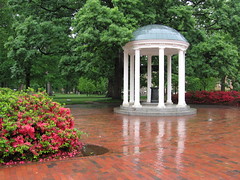
 Image by TimDan2 via Flickr
Image by TimDan2 via Flickr

I have always been a fan of Charles Kuralt, and have enjoyed and respected his work. The Learning Center was closed, but we were able to find a nice lady who gave us a very informative, and very personal tour. Since then I have revisited Mr. Kuralt's life through his biography, his books, and videos of his work at CBS News.

I particularily enjoyed his "On the Road" segments, where he traveled the country and reported on the interes
 Image via Wikipedia
Image via Wikipedia
A little more about Charles Kuralt's life from the Academy of Achievement (www.achivement.org) :
 | ||
 |
In 1957, still only months out of school, he was offered a job at CBS News. He was to remain with CBS for the rest of his life. His first assignment was writing the five-minute radio broadcasts that aired hourly between two and six AM. He began work each day at midnight, and worked until eight in the morning, but he was thrilled to be working in the same building as his hero, Edward R. Murrow. After a single week of substituting for a vacationing writer on Murrow's nightly broadcast, Kuralt was transferred to the fledgling television news department, as a writer for the CBS Evening News.
 |
He traveled everywhere, covering political conventions, presidential campaigns, wars in the Congo, Laos and Vietnam, school integration in the South and piracy on the high seas. In 1960, he was the first host of the prime time TV series Eyewitness. As Chief Latin American Correspondent he visited all 23 nations of the region. In 1963 he served as Chief West Coast Correspondent for CBS and then returned to the New York bureau.
 |
Besides appearing on the evening network news, his adventures provided material for a series of best-selling books, On the Road with Charles Kuralt and Dateline: America. His other books include To the Top of the World (an account of a trip to the Arctic), North Carolina Is My Home, and his best-selling autobiography, A Life on the Road.
Into the 1980s, Charles Kuralt continued to report from the road, while flying back to New York each weekend to anchor the CBS Sunday Morning show. During the Persian Gulf crisis, he co-anchored the nightly CBS News broadcast America Tonight. Over the course of his career, he won three Peabody awards and ten Emmy Awards for his broadcast journalism. Charles Kuralt died in New York City at the age of 62.
The newsman's death brought the unexpected revelation of an unusually complicated private life. For nearly 30 years, Kuralt had maintained one home with his wife in Manhattan, and another with his lover -- and her children by a previous marriage -- in San Francisco. Before his death, he transferred ownership of a mountain home in Montana to his lover, Patricia Shannon, but his family made claim to the adjoining property. Kuralt's lawful wife died before the final disposition of the case, and Mrs. Shannon succeeded in documenting, to the court's satisfaction, Kuralt's intent to leave her the entire property. The case provided a challenging study for scholars of probate and family law, and a poignant footnote to the life of an admired public figure.
Some of my favorite Kuralt quotes:
I remember being in the public library and my jaw just aching as I looked around at all those books I wanted to read. There just wasn't time enough to read everything I wanted to read.
I believe that writing is derivative. I think good writing comes from good reading.
I think all those people I did stories about measured their own success by the joy their work was giving them.
Thanks to the Interstate Highway System, it is now possible to travel across the country from coast to coast without seeing anything.
The love of family and the admiration of friends is much more important than wealth and privilege.
There are a lot of people who are doing wonderful things, quietly, with no motive of greed, or hostility toward other people, or delusions of superiority.
When we become a really mature, grown-up, wise society, we will put teachers at the center of the community, where they belong. We don't honor them enough, we don't pay them enough.

![Reblog this post [with Zemanta]](http://img.zemanta.com/reblog_e.png?x-id=a0ed4b67-fe2b-4bd4-bc37-6e56ac22faa9)
No comments:
Post a Comment